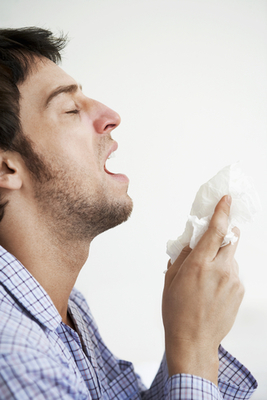Is Holding In A Sneeze Bad For You?
Short answer
Years of research shows holding a sneeze is not a good idea. Though serious injuries from holding in a sneeze are rare, they can still happen. Let your sneeze out - it's not worth the risk.
Harmful to your health. Very few, if any, benefits are present. Things in this category should be avoided as much as possible.
View Full Grading System
Category 'A'
Very healthy and numerous health benefits. Side effects are rare. Things rated an 'A+' are typically necessary for survival (for example, water).
Very healthy and numerous health benefits. A few harmful qualities may be associated, but only under certain circumstances such as an allergic reaction.
Very healthy and numerous health benefits. Harmful qualities may be associated, but aren't usually serious.
It is important to note that even the best things in life can become bad in immoderate amounts. So, although something may be rated an 'A+', overconsumption/overdoing can bring unwanted effects.
Category 'B'
Very beneficial to your health. Things rated a 'B+' may have a few harmful qualities to pay attention to.
Overall beneficial to your health. Things rated a 'B' may have some harmful qualities to pay attention to.
More beneficial to your health than not. However, harmful qualities are most likely associated and shouldn't be overlooked.
The main difference between category 'A' and category 'B' is the harmful qualities typically present in 'B' items. Serious side effects are usually uncommon, but are still possible and should be taken note of.
Category 'C'
Both beneficial and harmful qualities associated. Things rated a 'C+' are typically a bit more on the beneficial side. Still, moderation is important.
A fairly even ratio of beneficial and harmful qualities. Moderation is important. Very general topics that can lean towards both sides of the spectrum will be placed here as well. Rice, for example, can be good or bad depending on the type.
More harmful than beneficial. Side effects are common, especially when consumed/done excessively. Moderation is very important.
Category 'C' usually denotes to both good and bad qualities. When it comes to this category, it is important to keep this word in mind: moderation.
Category 'D'
Harmful to your health. Although benefits may be associated, the bad most likely outweighs the good. Moderation is very important.
Harmful to your health. A few benefits may be associated, but the bad outweighs the good. Moderation is extremely important.
Harmful to your health. Very few, if any, benefits are present. Things in this category should be avoided as much as possible.
Category 'D' is typically for things that are more harmful than beneficial. While consuming/doing something unhealthy once in a blue moon shouldn't hurt, we definitely recommend eliminating 'D' items as a regular part of your routine/diet.
Category 'F'
Category 'F' is for things that fail to bring anything beneficial to the table, and are very harmful to your health. We recommend completely avoiding anything in this category. Long-term side effects of 'F' items are usually very serious.
Category 'N'
'N' stands for neutral. Things placed into this category are generally (a) neither good nor bad for you, or (b) lack the necessary evidence to reach any conclusions.
Long answer
Sneezing helps you keep your body safe. It is an important part of the immune process, helping to keep our bodies healthy. Sneezing protects our body by clearing the nose of any harmful bacteria and viruses. When something foreign enters your nose or you encounter a trigger that sets off your ‘sneeze centre’ in the brain, which is located in the lower brain stem, signals will rapidly send to tightly close your throat, eyes, and mouth.
Then, your chest muscles will vigorously contract, causing your throat muscles to quickly relax. This will create air – along with saliva and mucus – to be forced out of your mouth and nose. Hence, causing a sneeze!
Prior to a sneeze, a great amount of air pressure will build in the lungs in order to prepare being forced through the nasal cavity to clear any irritants out of the nasal passages. If you hold the sneeze in by pinching the nose or simply closing the mouth, the pressurized air is going to be forced back through the Eustachian tube and into the middle ear cavity. The pressure from a sneeze is capable of causing middle ear and inner ear damage, also including a ruptured ear drum. Though the risk of a hearing loss is pretty low, it is still possible.
Blocked sneezes can also lead to injury of the diaphragm, a broken blood vessel in the eye, and even a ruptured blood vessel in the brain due to the quick and extreme increase of blood pressure while holding it in. Although many people have held in countless sneezes in their life without experiencing any complications, a few get unlucky and experience these lethal side effects.
Bottom Line: It's not worth the risk - release the sneeze!
Possible short-term side effects
- throat pain
-
vertigo
-
ruptured ear drum
-
hearing loss
-
ruptured blood vessel in eye
-
ruptured blood vessel in brain
Benefits
- stop from spreading germs
-
stop from the loud noise
Healthier alternatives
Please turn your Ad Blocker off to see this content. Thank you!
Thank you for your feedback!
Written by Healthy Living 35
Published on: 12-28-2015
Last updated: 12-10-2016
Thank you for your feedback!
Written by Healthy Living 35
Published on: 12-28-2015
Last updated: 12-10-2016

 Approved by
Approved by 















